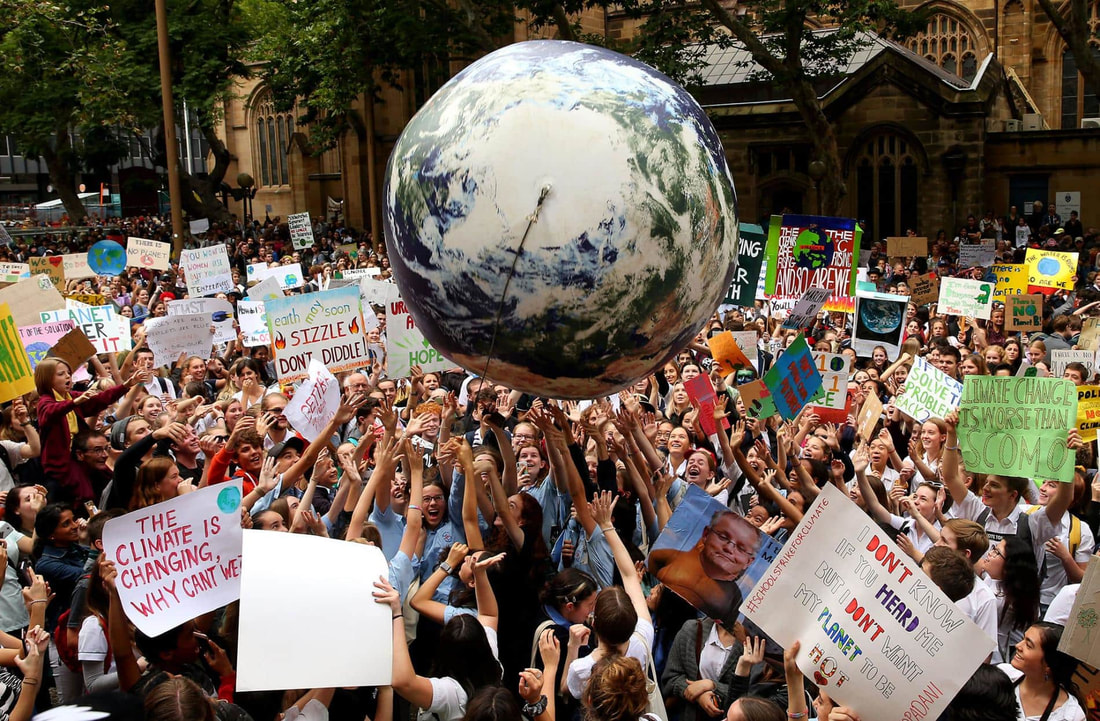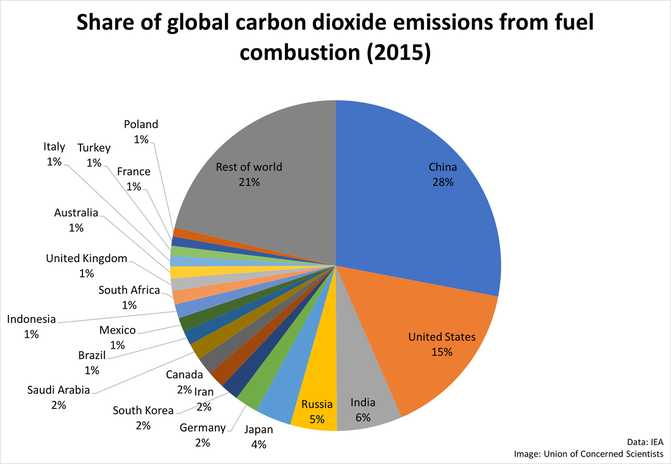 A significant event uniting young people across the globe occurred on Friday March 15, 2019. It was deemed a student strike for action on Climate Change. Young climate activists are hoping to spark a widespread dialogue about climate change. The coordinators of the event were obviously following in the footsteps of their peers in Parkland, Florida, who led a national conversation in the USA about gun control after a mass shooting at their school. But it was sixteen-year-old Greta Thunberg that kicked off the "climate action" movement last summer in Sweden and subsequently gained attention when she delivered a powerful speech at the United Nations climate summit in December 2018. The wave of 'students skipping school’ under a banner such as "US Youth Climate Strike" was replicated, according to the BBC in student marches in more than 100 countries including South Africa, India, New Zealand and South Korea. And in Europe, students marched in London, Lisbon, Vienna, Rome and Copenhagen, among others. Some rallies were reported to have attracted tens of thousands. This happening raises several questions: What were the demands? Why the urgency? Which countries contribute the most to the global problem? How to accelerate the momentum of this global movement toward achieving the targets of Sustainable Development Goal #13: Climate action by 2030? The targets of SDG 13 aim to take action to combat climate change and its impacts by regulating emissions and promoting developments in renewable energy. What are the Demands? Although student demands varied from country-to-country, the common concern was the need to reduce greenhouse gas emissions. The menu of demands is best illustrated on the Youth Climate Strike website:
Why the urgency? Economic development and climate change are intricately linked. The linkages are particularly so among indicators of poverty, gender equality, energy and the environment. The youth are rightly concerned about the slow pace of action taken by governments and the private sectors at the national, regional and international levels. Despite numerous international commitments, the situation is serious according to a 2018 report from the UN Intergovernmental Panel on Climate Change (IPCC). It states that the planet will reach the crucial threshold of 1.5 degrees Celsius (2.7 degrees Fahrenheit) above pre-industrial levels by as early as 2030. This will trigger greater risks of extreme drought, wildfires, floods and food shortages for hundreds of millions of people. Temperature records for the planet, monitored independently by the National Centers for Environmental Information, go back to 1880. They show that the planet is already two-thirds of the way toward exceeding the target for greenhouse emissions with global temperatures having warmed about 1 degree C. They also show that the most recent years , 2015-2017 are so far the three hottest years on record. Therefore, avoiding going to even higher levels will require significant action in the next few years. Global net emissions of carbon dioxide would need to fall by 45% from 2010 levels by 2030 and reach "net zero" around 2050 in order to keep global warming around 1.5 degrees C. Lowering emissions to this degree, while technically possible, would require widespread changes how we deal with energy, industry, buildings, transportation and cities. Which Countries Contribute most to the Global Problem While the window on keeping global warming below 1.5 degrees C is closing rapidly, implementing the emissions pledges made by195 countries that were signatories to the 2015 Paris Accord do not add up to us achieving that goal in the 11 years left to 2030. The agreement is to combat climate change and to accelerate and intensify the actions and investments needed for a sustainable low carbon future. The major burden resides in countries that contribute most to the high shares of global carbon dioxide emissions from fuel combustion. These are China (28%), USA (15%), India (6%) Russia (5%) and Japan (4%). How to overcome? Ironically the most affected countries contribute least to the global problem They are the Caribbean, Indian Islands and Pacific Islands. As a result, they have combined through the Small Island Development States Forum referred as the SIDS DOCK to make demands on four principal functions from the Paris Accord:
In March 2014, in partnership with the United Nations Industrial and Development Organization (UNIDO), the Government of Austria extended support under a Memorandum of Understanding, with a grant of 1 million euros, for start-up activities for Centres for Renewable Energy and Energy Efficiency in the Caribbean the Pacific, African and for a centre in the Indian Ocean region. These new centres are supposed to act as hubs, assisting SIDS to translate commitments to actions. In this regard, SIDS DOCK is highly complementary to the work being done under the UN Sustainable Energy For All (SE4All) Initiative. What this means is that SIDS is the largest group of signatories, with the highest ambitions and SIDS DOCK coincides with the demands of the 2019 Youth Students March for Action. Achieving Sustainability With special reference to youth initiatives, there are several pillars on which to build partnerships to achieve the SDG #13 on climate action. Among these pillars are the SIDS Innovation, the Zero Hour Movement, and the CARICOM Climate Change Youth Forum. SIDS an example of genuine partnership around an innovative idea The Hon. Roosevelt Skerrit, Prime Minister of Dominica in his country’s capacity as Chair of the SIDS DOCK Steering Committee, said that SIDS DOCK represents a significant achievement in solidifying SIDS-SIDS relationships and cooperation. He called it “an extraordinary lesson learned of what can happen when a genuine partner takes ‘a chance’ on a new and innovative idea that has the potential to help SIDS adapt and become more resilient to the changing climate and sea level rise.” Following hurricanes Irma and Maria that devastated Dominica, Prime Minister Skerrit advocated for, and is leading the charge to establish a Climate Resilient Island State. This is a major innovative goal in the framework of SIDS and the Paris Accord. Zero Hour is a movement of a diverse group of youth promoting a conversation around climate and environmental justice Zero Hour facilitates training and resources for new young activists and organizers (and adults who support their vision) wanting to take concrete action around climate change. The aim is for youth organizing to protect their rights and access to the natural resources and a clean, safe, and healthy environment that will ensure a livable future where they just not survive, but flourish. The Caribbean Community Climate Change Youth Forum This CARICOM Institution referred to as 5Cs is intent on sending a clear message to youths across the Caribbean, understanding their critical role as decision-makers and implementers in a climate-aware society. Its programme, Climate Change and Youth – Education today for tomorrow’s leaders is an outreach campaign, particularly geared towards the High School audience piloted in Belize. The emphasis is on understanding the individual contributions, highlighting options of individuals to mitigate and adapt to climate change and developing a climate change tool kit in the form of a data driven booklet, possibly displayed digitally to reach the widest cross section of youth. These examples of innovations that are intended to remove the misconceptions and mainstream the schools' curricula and public awareness campaigns designed to reach young people efficiently and comprehensively. The future of Climate Action through Collective Leadership - The potential of the Caribbean Youth Ambassadors Corps Connecting the Pillars of climate action is vital to SDG #13 by 2030. Around the world, as attested to by the Youth Climate Action, there are several possibilities for sustaining the role of youth. Yet a potentially vibrant source for connecting these pillars goes almost unrecognized. It is the CARICOM Youth Ambassadors (CYA) Corps that falls under the umbrella of the Caribbean Community. The CYA has received a fillip under the current regime of CARICOM Secretary General Ambassador Irwin LaRocque, who has convened annual engagements of CYAs, thereby institutionalizing their roles within the decision making apparatus of the Caribbean Community. They have been actively engaged under the Youth Advocacy Programme of the PANCAP Caribbean Partnership against HIV (PANCAP) located in the CARICOM Secretariat. The CYAs interface with national youth groups and 'marginalized' youth. In 2010, the CYAs completed a report The EYE on the Future which it presented to CARICOM Heads of Governments in Suriname as a template for action. Many of the architects and participants in that venture have graduated to leading positions in International and regional organizations, one is as cabinet minister in a national government. Others are private sector executives, professors, health, education and legal practitioners, media operatives and respected advocates for social justice and equity in leading NGOs. Within the objectives of SIDS, the CYA is a unique structure championing rights-based approaches to adaptation and resilience-building In so doing it would help to build a movement of people creating, demonstrating and advocating for climate justice and climate resistance It however needs financial support to consolidate its true potential. The Caribbean has a golden opportunity to influence the next round of student climate action by focusing on collective leadership with specific objectives:
As Ms Ezbai Francis CYA from St Lucia describes the task - " sensitize, collaborate and mobilize" Eddie Greene
3 Comments
Paula M
3/22/2019 01:16:39 pm
Please note happening now
Reply
Carla Barnett
3/26/2019 05:43:21 am
Am just seeing this and learning of this new (relatively) initiative of yours and Auriol. Global Frontier. Brilliant concept. You have a lot of knowledge to share and lots of work to do.
Reply
Aradhna Tripati
3/29/2019 02:56:03 pm
Dear Eddie,
Reply
Leave a Reply. |
Details
AuthorEdward and Auriol Greene Directors, GOFAD. Archives
April 2022
Categories |
Global Frontier Site Links |
Contact InformationEmail: [email protected]
Twitter: @GofadGlobal |


 RSS Feed
RSS Feed
